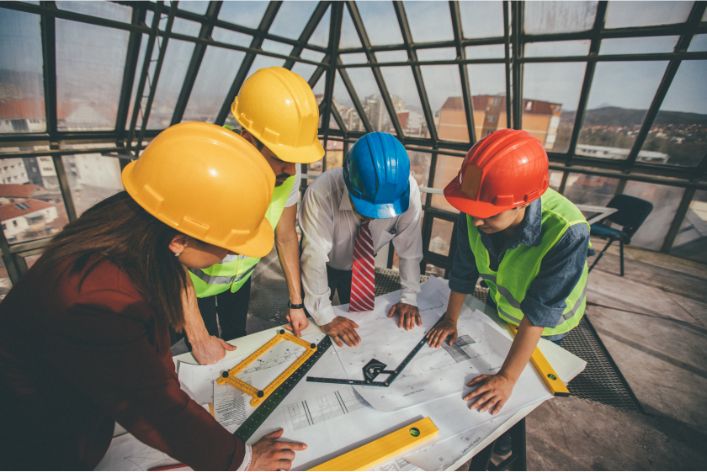Introduction
Sustainable building practices refer to construction techniques that prioritize the use of eco-friendly materials and minimize resource waste. In Nigeria, sustainable building practices are crucial in mitigating the impact of climate change and promoting sustainable development.
Adopting these practices has a positive impact on the environment and helps reduce carbon emissions. Additionally, it promotes energy efficiency and reduces overall costs of construction, making sustainable buildings a more affordable and profitable investment.
Sustainable building practices also promote a healthy living environment by ensuring that buildings are free of toxins and hazardous materials, improving the health of occupants.
Furthermore, sustainable building practices align with Nigeria’s commitment to the Sustainable Development Goals, particularly Goal 11, which aims to make cities and human settlements inclusive, safe, resilient, and sustainable.
Generally, sustainable building practices are essential in the construction industry, and their adoption in Nigeria can have a positive impact on the environment and economy, promoting sustainable development.
Read: Top 10 Highest Paying Professions in Nigeria: 2023 Edition
Sustainable Building Materials
Sustainable building practices are becoming increasingly important in Nigeria’s construction industry. One crucial aspect of sustainable building is the use of sustainable building materials.
Sustainable building materials have a lower environmental impact compared to conventional ones and contribute to reducing the carbon footprint of a building.
Overview of Sustainable Building Materials
- Sustainable building materials are those that are eco-friendly, durable, and do not harm the environment.
- They are produced locally and have minimal transportation costs, which reduces their carbon footprint.
- These materials can be obtained from various sources such as recycled or reclaimed materials, renewable resources, and natural materials such as bamboo and straw.
- Sustainable building materials also include low-emission materials that do not release harmful gases into the environment during their production or disposal.
Examples of Sustainable Building Materials Used in Nigeria
- Timber: Wood from responsibly managed forests is an excellent sustainable building material used in Nigeria. It is durable, renewable, and biodegradable.
- Bamboo: Bamboo is an ideal material for building structures that are strong, affordable, and eco-friendly. It can be used as flooring, wall panels, and roofing.
- Recycled Metal: Scrap metal is a sustainable building material that can be used for roofing and cladding. It can be obtained from waste and junkyards, reducing the need for new material production.
- Eco Bricks: Eco bricks are made from plastic waste and are an excellent alternative to traditional building materials. They are durable, eco-friendly, and reduce plastic waste pollution in the environment.
Benefits of Using Sustainable Building Materials
- Reduces Carbon Footprint: Sustainable building materials have a lower environmental impact than conventional materials, reducing the carbon footprint of a building.
- Cost-effective: Sustainable building materials are affordable and can actually reduce the overall cost of building construction.
- Promotes Environmental Preservation: The use of sustainable building materials promotes environmental preservation by reducing waste and pollution as well as preserving natural resources for future generations.
- Improved Indoor Air Quality: Sustainable building materials such as low-emission paints and finishes minimize the release of toxic gases and chemicals, improving indoor air quality.
- Healthier Living Spaces: Natural materials such as bamboo and straw improve indoor air quality while creating a healthier living environment.
On a short note, the use of sustainable building materials in Nigeria’s construction industry is crucial to creating a sustainable built environment that is in harmony with the natural world.
The use of these materials not only reduces the environmental impact of construction but also benefits the occupants’ health and well-being.
The adoption of sustainable building practices should be encouraged in Nigeria and beyond to promote a greener and more sustainable future.
Read: Decoding the Nigerian Constitution: Rights & Obligations
Energy Efficiency in Construction
Energy efficiency is an essential aspect of sustainable building practices in Nigeria’s construction industry.
It involves creating buildings that consume less energy and reduce environmental impact. Here are some examples of energy-saving measures implemented in construction:
Energy-efficient building practices in Nigeria
- Installation of solar panels for electricity and hot water.
- Use of energy-efficient lighting systems such as LED and CFL bulbs.
- Incorporation of insulation to reduce heat loss.
- Use of energy-efficient appliances in buildings.
- Implementation of natural ventilation instead of air conditioning.
- Use of low-emissivity windows to reduce heat transfer.
- Consideration of building orientation to maximize daylight and minimize heat gain.
Benefits of energy efficiency in construction
- Cost savings: Energy-efficient buildings are more cost-effective to operate and maintain.
- Environmental protection: Reduced energy use leads to lower greenhouse gas emissions and a smaller carbon footprint.
- Improved building performance: Energy-efficient buildings provide better indoor air quality, thermal comfort, and lighting conditions.
- Increased asset value: Energy-efficient buildings have higher resale and rental values.
- Compliance with regulations: Many countries have building codes that require energy-efficient design and construction.
- Leadership and reputation: Energy-efficient buildings are seen as a symbol of responsible and sustainable development.
In essence, energy efficiency is a critical strategy in sustainable building practices in Nigeria’s construction industry.
Therefore, it is essential to implement energy-saving measures in building design and construction to reduce energy use, protect the environment, improve building performance, and provide economic benefits.
Read: The Impact of Nigerian Laws on Business Operations
Water Conservation in Construction
Water is essential in every aspect of our lives, and the construction industry is no exception. However, with water becoming scarcer every day, it is important for us to conserve water in every way possible.
Let’s discuss water conservation practices in building and construction, examples of water-saving techniques employed in Nigeria, and the benefits of water conservation in construction.
Water conservation practices in building and construction
- Reuse and recycle water: One of the best ways to conserve water in construction is to reuse and recycle it. This can be achieved by collecting rainwater and using it for construction purposes such as mixing concrete or cleaning equipment.
- Use low-flow fixtures: Low-flow fixtures such as faucets, showerheads, and toilets can help reduce water consumption in buildings. These fixtures use less water, which can add up over time.
- Eliminate leaks: Water leaks can waste a lot of water, so it is important to identify and fix leaks as soon as they are detected.
- Employ green landscaping practices: Landscaping practices such as xeriscaping, which involves using plants that require little water, can help reduce outdoor water use.
Examples of water-saving techniques employed in Nigeria
- Harvesting rainwater: In Nigeria, rainwater harvesting is becoming increasingly popular. It involves collecting rainwater and storing it for later use.
- Using drip irrigation: Drip irrigation is a technique that involves delivering water directly to the roots of plants, reducing water waste and promoting better plant growth.
- Treating and reusing wastewater: Wastewater can be treated and reused for non-potable purposes such as flushing toilets, washing equipment, or irrigating plants.
Benefits of water conservation in construction
- Environmental benefits: Conserving water helps reduce the strain on freshwater resources and ensures that we use water more sustainably.
- Cost savings: Water conservation measures such as using low-flow fixtures or rainwater harvesting can help reduce water bills, saving construction companies money in the long run.
- Improved reputation: Employing water conservation practices can help construction companies improve their reputation and appeal to customers who are committed to sustainability.
- Compliance with regulations: Many countries have regulations in place that require construction companies to conserve water. By adopting water-saving techniques, construction companies can stay compliant with these regulations.
In short, water conservation is an important practice in the construction industry.
By reusing and recycling water, using low-flow fixtures, eliminating leaks, employing green landscaping practices, and using water-saving techniques such as rainwater harvesting, drip irrigation, and wastewater recycling, construction companies can save money, protect the environment, and improve their reputation.
Read: How to Become a Licensed Real Estate Agent in Nigeria

Waste Management in Building and Construction
The construction industry has a significant impact on the environment and generates a large amount of waste.
Therefore, waste management is essential in promoting sustainable building practices in Nigeria. Here is an overview of waste management practices in construction:
Overview of waste management practices in construction
- Construction waste includes materials from building, demolition, and renovation activities.
- Improper disposal of waste can lead to environmental pollution and health hazards.
- Waste management in construction involves reducing, reusing, recycling, and proper disposal of waste.
- The waste hierarchy provides a framework for waste management, with the most preferred action being waste reduction.
- Construction waste can be categorized into four main types: hazardous waste, non-hazardous waste, inert waste, and mixed waste.
Examples of construction waste management in Nigeria
- The LafargeHolcim cement plant in Ewekoro, Ogun State, has implemented several waste management practices, including the use of alternative fuels and raw materials, recycling, and waste reduction.
- The Lagos State Government has established a waste management agency to manage waste in the state, including construction waste.
- In Abuja, the Ministry of the Federal Capital Territory has set up a recycling plant for construction waste.
- The Nigerian Institute of Building has started a campaign to promote sustainable building practices, including proper waste management.
Benefits of proper waste management in construction
- Proper waste management can reduce the environmental impact of construction activities and promote sustainability.
- Waste reduction can result in cost savings for construction companies by reducing waste disposal fees and material costs.
- Recycling of construction waste can conserve natural resources, such as timber and minerals.
- Proper waste management can prevent health hazards for workers and nearby communities.
- The promotion of sustainable building practices can enhance the reputation of construction companies and attract environmentally conscious clients.
In review, waste management is a crucial aspect of promoting sustainable building practices in Nigeria’s construction industry. The implementation of waste reduction, reuse, recycling, and proper disposal practices can reduce the environmental impact of construction activities, save costs, and promote sustainability.
Read: Landscape of Affordable Housing in Nigeria’s Real Estate
Challenges Facing Sustainable Building Practices in Nigeria
Sustainable building practices are crucial in promoting a greener, healthier, and more economically viable environment.
However, in Nigeria, the implementation of these practices faces several challenges that hinder their optimization.
Overview of challenges facing sustainable building practices in Nigeria
One of the significant challenges facing sustainable building practices in Nigeria is the high cost of sustainable materials.
This factor is primarily attributable to the dearth of locally manufactured building materials, making the procurement of materials such as solar panels and energy-efficient lighting fixtures expensive. Additionally, high taxes and import duties increase the prices of these materials further.
Lack of awareness and knowledge of sustainable building practices among professionals and the general public is another challenge.
Due to the limited scope of green building infrastructure in Nigeria and inadequate training facilities for professionals, there is a scarcity of expertise in the field. This gap adversely affects the implementation of sustainable building practices in Nigeria.
Consequently, sustainable building practices are not widespread in Nigeria, and the few existing ones are often poorly implemented due to inadequate knowledge.
Examples of challenges
- High cost of sustainable materials
- Limited scope of green building infrastructure in Nigeria
- Inadequate knowledge among professionals and the general public
- Inadequate training facilities
Solutions to overcome these challenges
To address the high cost of sustainable materials, the government needs to encourage local production and manufacture of these materials. Tax incentives and import duty waiver can also incentivize local production further.
Moreover, public-private partnerships can aid in supporting local manufacturers in developing sustainable building materials at cheaper rates.
The lack of awareness and knowledge of sustainable building practices can be tackled through comprehensive education and training programs geared towards professionals and individuals.
These programs will increase the knowledge and expertise required to implement sustainable building practices effectively. Awareness campaigns can also be launched to sensitize the public on green building practices.
Finally, the establishment of more training facilities focused on sustainability will boost the capacity of professionals to employ sustainable building practices confidently.
The challenges confronting sustainable building practices in Nigeria can be ameliorated through concerted efforts by stakeholders in the construction industry.
The promotion of sustainable building practices will not only create a healthier environment but also a more economically viable one. Governments, private sector players, and the public must take up their responsibility in the promotion of sustainable building practices in Nigeria.
Read: Roles and Responsibilities of Lawyers in Nigeria
Conclusion
Sustainable building practices in Nigeria have numerous benefits. They create comfortable and healthy living spaces, reduce energy consumption, and decrease environmental pollution.
Additionally, they improve the economic viability of building projects and contribute to the overall sustainable development of Nigeria.
There’s a need for increased application and adoption of sustainable building practices in Nigeria. Architects, engineers, and building professionals should prioritize sustainable practices in their designs and constructions.
Government policies should also encourage and incentivize the use of sustainable practices. Nigerians should embrace and promote sustainable building practices to create a brighter, healthier, and more sustainable living environment.




